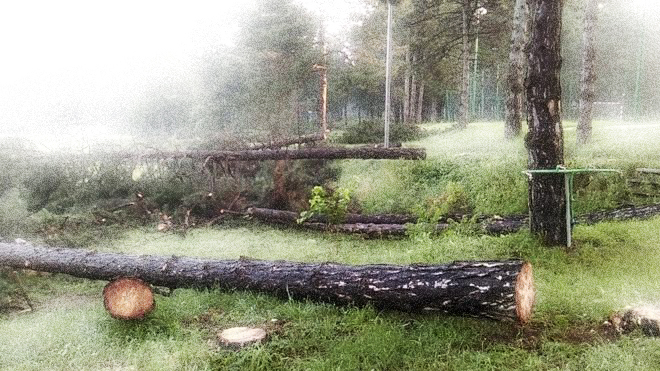The project combines creative techniques and activism in a desire to find the most effective means of launching civic initiatives and a way to inspire citizens to mobilise in against excessive tree felling in Belgrade and Serbia.
When the fruit tree falls, it’s screams from one side of the world reaches the other, even if no one can hear it. [Hasidic proverb]
The best time to plant a tree is twenty years ago. The second best time is now. [Chinese proverb]
We are witnessing excessive trees cut down in our city in order to build shopping malls, garages, gondolas and other tourist attractions. Is Belgrade gradually becoming a city of concrete? Faculty of Forestry (University of Belgrade) data shows that in 2018, 19% more trees were cut down than in previous years. In 2019 increased for more 2% and the tendency continues. Global deforestation continues at an alarming rate: 7-8 million hectares of forests are destroyed every year, which is approximately the size of Portugal. The world average green area per capita is 20-40m2. In Belgrade it is 1m2.
Trees not only provide us with oxygen, they also have a number of characteristics important for our spiritual and physical health. 60% of medicines come from trees, and the latest research shows even more. Experts warn that consequences of the Global deforestation are far-reaching – from air pollution to floods, wildfires and complete destruction of ecosystems on the Earth.
Trees are an important factor in the fight against rising global temperatures, due to their ability to absorb carbon dioxide. The authors say that planting trees is currently the most efficient solution for climate change in the world. Researchers claim that if the world wants to limit the growth of temperatures by one and a half degrees by 2050, it is necessary to plant another billion hectares of forests.
Will we realise in time their significance for the survival of humanity? How to raise awareness of that importance? This show / project is one course of action.
We are witnessing that traditional means of information, statistics, political speeches and conferences, and even social activism in practice change the things very slowly and on even creates certain passivity in citizens, who leave the responsibility to someone else. The artistic language we use reaches directly the hearts and minds of the audience.
The Project received the award FIXING THE FUTURE-CLIMATE INNOVATION 2021 by Austrian Radio Ö1 and it was presented at the Innovation Festival Future Market in Graz, from October 1 to 3, 2021.
Our Project is the Case Study in the course Teaching Artistry for Social Impact on WWW.KADENZE.COM – as an exemplary artistic project about the climate change.

In addition to the obvious importance of the survival of trees on the planet, without which there would be no living conditions, the project also relies on the growing need of many people and organizations to formulate and recognize the rights of all living beings including trees, to a dignified life.
Our research led us to the Declaration of the Rights of Trees adopted at the symposium “Incredible Trees” held on April 5, 2019 at the French Parliament.
In 1992 the Swiss Constitution included a provision requiring “the dignity of all beings – humans, animals, plants and other organisms – to be taken into account”. Residents of Ecuador voted for a new constitution in 2008 that recognized the judicial rights of ecosystems. Thus, the nation’s rivers, forests and air are no longer mere property, but holders of rights with the “right to exist, persevere and regenerate.” In 2012, Bolivia passed the Mother Earth Act, which gives nature the same rights as people.
Many examples foster hope that change is possible and underline the importance of globally expanding civic initiatives.
One of the inspiring examples is the winner of the Nobel Peace Prize in 1977, Vangari Maathai of Kenya. This first African woman to receive the Nobel Prize started the Green Belt Movement, which aimed to combat deforestation. The campaign prompted women to plant trees in their local environment and to think ecologically. The movement spread to other African countries and contributed to the planting of more than thirty million trees. Her work also inspired a boy from Germany, Felix Finkbeiner, who was only nine years old when promoted the idea of planting a million trees in every country on the planet. In 2011, at the age of fifteen, he spoke at the United Nations about the need to save the planet, and since then he has developed a global network of young activists working on slowing down the global warming by afforesting the planet. Plant-for-the-Planet, the environmental group he founded, has planted more than 14 billion trees in more than 130 countries [www.trilliontreecampaign.org/] .
Unfortunately, on the other side, the resistance of conservative members of political and economic organizations, which deny climate change and justify the process of nature degradation to the needs of “economic growth”, is also growing strong.
Moreover, the sense of fear of the future and the facts about the fatal deterioration of the climate and ecosystems on the planet, seem to contribute to the increase of denial and lead to a radical turn towards totalitarian ideas and populism of politicians.
The DANCING TREES project aims to sensitize the audience and ignite civic initiatives in defence against excessive tree felling. It wants to inspire creative ways to resist this situation and motivate citizens to get involved, network and engage in the defence of trees and forests.

